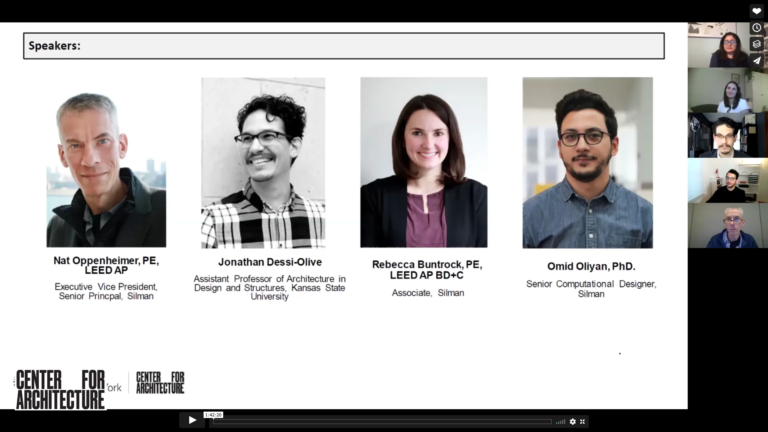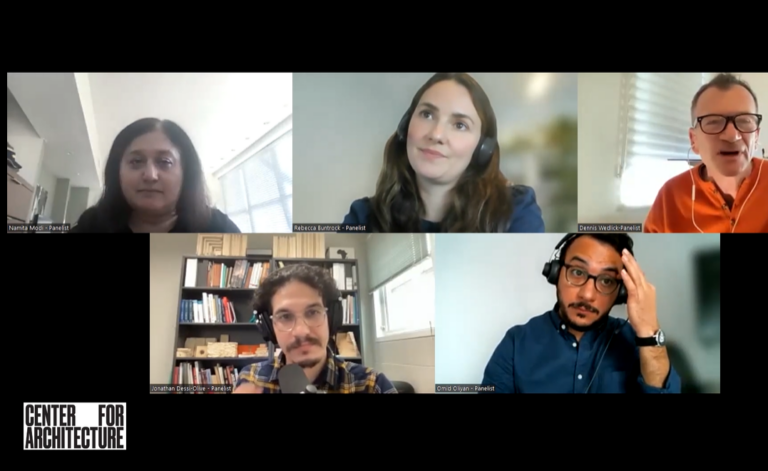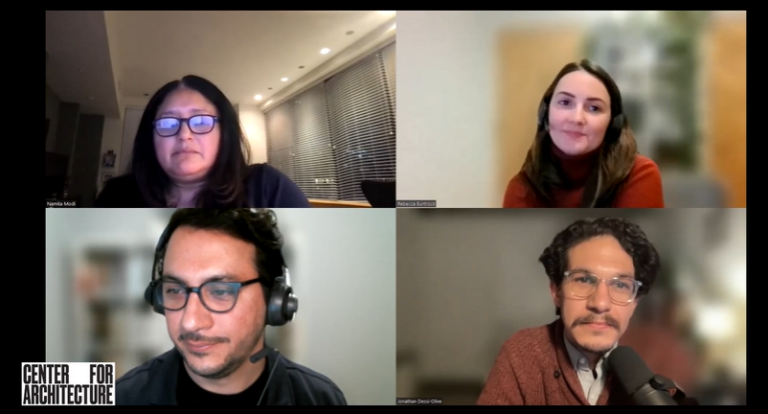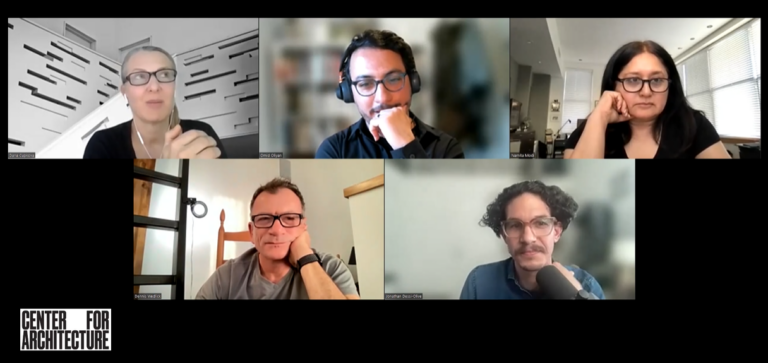The Mycelium House is a series of design workshops exploring the use of mycelium, the thread-like structures (hyphae) in fungi, as a residential building material in combination with other zero-carbon fibers and substrates to build tiny, tent-like shelters. In the past two years, the AIANY Custom Residential Architects Network has assembled a team of architects, engineers, (myco)builders, students, and specialized consultants to explore the use of mycelium as a potential building material in residential construction. Through structural, computational, and physical material studies and fabrications in a mock-studio setting, the first set of workshops led to the development of a new form for the material: mycelium sheets for indoor residential applications. This work was shared with the broader AIANY community through an augmented reality installation at the Center for Architecture in February 2022.
The success of this initial project led the team to explore the use of these mycelium sheets in the design of a zero-carbon tiny home. In the second set of workshops, the team explored AI-generated forms for a mycelium house. At the same time, another sculptural form from the first series of workshops, the Phoenix, composed of bent sheets suspended with wires, was developed by computational design and fabricated. The Phoenix’s scale, flexibility, lightness, and sound absorption made it suitable for the design of a small house.
This program is a culmination of three workshops that began last fall and continued into this spring. It is retrospective and a celebration of this work, which will be presented through physical mycelium prototypes and pre-recorded discussions with consultants, such as building scientists and AI experts. Come meet the Mycelium Project team, who will share their reflections on the work in a reception for this exhibition.
About the Speakers:
Bill Browning is one of the green building and real estate industry’s foremost thinkers and strategists and an advocate for sustainable design solutions at all levels of business, government, and civil society. His expertise has been sought out by organizations as diverse as Fortune 500 companies, leading universities, non-profit organizations, the US military, and foreign governments.
Rebecca Buntrock joined Silman in 2010 and was promoted to Associate in 2018 and Senior Associate in 2021. As a studio leader, she has managed a variety of projects for all types of building construction and has a special expertise in historic preservation and existing buildings. She was the sixth Robert Silman Fellow for Preservation Engineering at the National Trust for Historic Preservation. Buntrock is active in industry organizations and currently serves as the President of the Association for Preservation Technology, Northeast Chapter (APTNE).
Jonathan Dessi-Olive is a researcher, designer, and educator. His work takes a critical approach to technology while integrating the history and theory of architecture, contemporary construction, and computational design. Presently he is an Assistant Professor of Architecture in Building Technology and Building Design Integration at the University of North Carolina Charlotte, where he teaches architecture studios, seminars, and structural design. Previously he taught at Kansas State University.
Nico Kienzl is a founding director of Atelier Ten’s New York City office with over 20 years of experience in sustainability consulting with expertise on the application of advanced building analysis for façade optimization, daylight and shading analysis, and optimization of building systems. Kienzl has played a significant role in a wide variety of residential, commercial, institutional, cultural, and masterplan projects throughout the US and internationally, influencing the building industry to move towards a more sustainable future. As Director, he has consulted on over 150 high-performance building projects worldwide.
Omid Oliyan is a computational designer and researcher with a background in Structural Engineering and Architectural Technology. His research explores the capacities of digital technologies to inform and enhance the design and delivery process. His experimental design work explores the entangled relationships between materiality, structure, and form through the lens of digital design and digital fabrication. Omid is also an educator in design and technology and has taught numerous courses, seminars, and workshops on computational design and design optimization.
Nat Oppenheimer joined the firm in 1988 and has extensive experience in the areas of new construction, renovation, sustainable engineering, and historic preservation as Principal in Charge of much of the firm’s institutional, private residential, and educational work. Since 2013, he has been an active participant of the Industry Advisory Group for the US Department of Statue Bureau of Overseas Building Operations. He is also a member of the Grace Farms Foundation Architecture + Construction Working Group, an interdisciplinary group of A/E leaders who are advocating to end the use of modern slavery in the supply chain and labor for the built environment.
Speakers:
Bill Browning, Hon. AIA, LEED AP, Partner, Terrapin Bright Green
Rebecca Buntrock, PE, LEED AP, Senior Associate, Silman
Jonathan Dessi-Olive, Assistant Professor of Architecture in Building Technology and Design Integration, University of North Carolina at Charlotte
Nico Kienzl, DDes, LEED Fellow, Director, Atelier Ten
Omid Oliyan, PhD, Computational Designer, OPLUS
Nat Oppenheimer, PE, Senior Vice President, Silman



